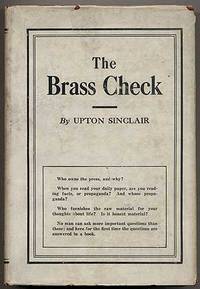The Brass Check

Ninth, and Revised Edition with Index
|
|
| Author | Upton Sinclair |
|---|---|
| Country | United States |
| Language | English |
| Genre | Sociology, Muckraking |
| Publisher | Self (Pasadena, California) |
|
Publication date
|
1919 |
| Media type | Print (Hardcover) |
| Preceded by | The Profits of Religion |
| Followed by | The Goose-Step |
The Brass Check is a muckraking exposé of American journalism by Upton Sinclair published in 1919. It focuses mainly on newspapers and the Associated Press wire service, along with a few magazines. Other critiques of the press had appeared, but Sinclair reached a wider audience with his personal fame and lively, provocative writing style. Among those critiqued was William Randolph Hearst, who made routine use of yellow journalism in his widespread newspaper and magazine business.
Sinclair called The Brass Check "the most important and most dangerous book I have ever written." The University of Illinois Press released a new edition of the book in 2003, which contains a preface by Robert W. McChesney and Ben Scott. The text is also freely available on the Internet, as Sinclair opted not to copyright the text in an effort to maximize its readership.
For much of Sinclair's career he was known as a "two book author": for writing The Jungle and The Brass Check. Sinclair organized ten printings of The Brass Check in its first decade and sold over 150,000 copies.
The book is one of the "Dead Hand" series: six books Sinclair wrote on American institutions. The series also includes The Profits of Religion, The Goose-step (higher education), The Goslings (elementary and high school education), Mammonart (great literature, art and music) and Money Writes! (literature). The term "Dead Hand" criticizes Adam Smith’s concept that allowing an "invisible hand" of capitalist greed to shape economic relations provides the best result for society as a whole.
A brass check was the token purchased by a customer in a brothel and given to the woman of his choice. Sinclair implies that, in a similar fashion, the owners of the mass media purchase journalists' services in supporting the owners' political and financial interests.
...
Wikipedia
